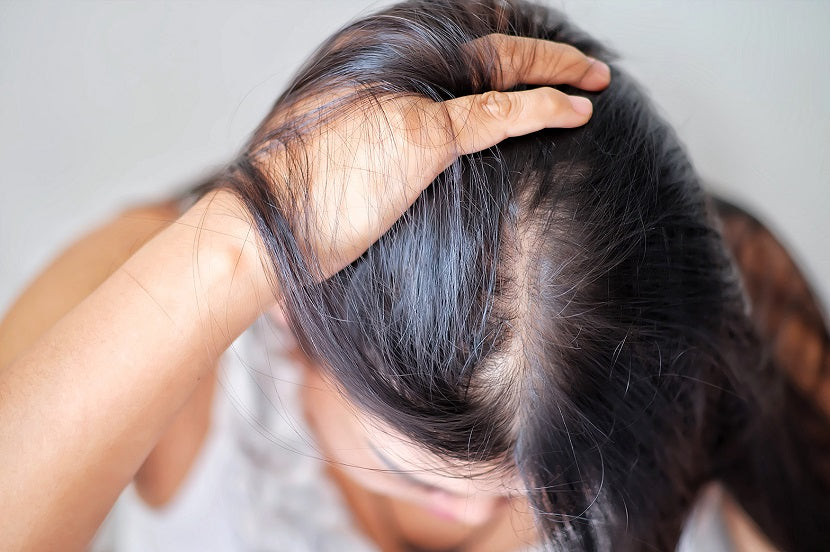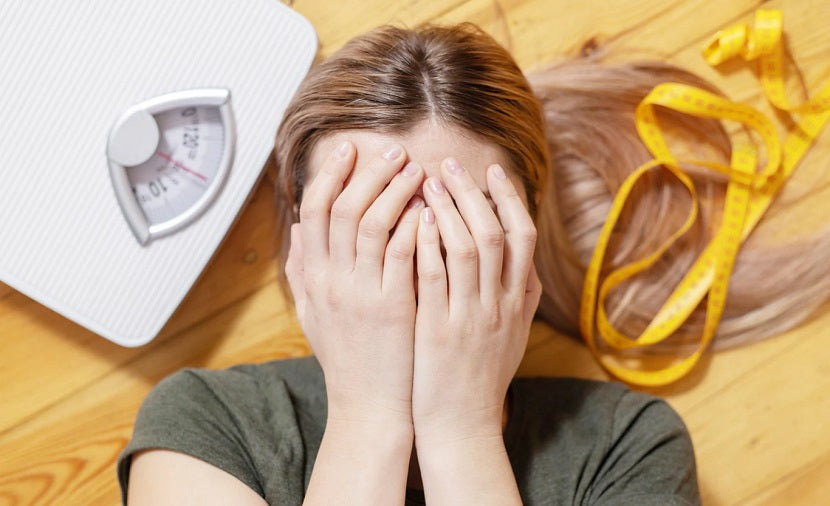Hair thinning and loss can be a major health concern for many people. Hair loss has many causes, including hormonal imbalances, low thyroid function, autoimmune conditions, stress, and nutritional deficiencies.
Weak digestion is also a significant factor, as it hinders the absorption of essential nutrients needed for hair growth. Addressing the root causes is always the best approach.
This article explores the common factors we see in our private practice and communities every day.
Hormones and Hair Loss
Hair loss is often a direct result of fluctuating hormone levels. The two main hormones involved in hair growth are estrogen and testosterone. Oestrogenic alopecia, the most common type of hair loss among women experiencing hormonal imbalance, is directly attributed to a fall in estrogen levels. Estrogen helps hair grow faster and stay on the head longer, leading to thicker and healthier hair.
Conversely, as estrogen levels decrease, the male hormone androgen increases, causing androgenic alopecia. An androgen known as dihydrotestosterone (DHT) binds to hair follicles and forces them into the resting phase (telogen) sooner than normal, resulting in thinner hair with each growth cycle. Testosterone also shrinks hair follicles, causing scalp hair loss but increasing facial hair growth.
Stress and Hair Loss
Stress is another major factor that can exacerbate hair loss. Chronic stress can lead to hormonal imbalances, weaken the immune system, and impact overall health, including hair health. Managing stress through mindfulness practices, regular exercise, and adequate sleep is crucial for maintaining healthy hair. Happy Calm is the perfect solution if stress is your major culprit.
Digestion and Hair Health
Weak digestion means the body cannot absorb the nutrients necessary for building strong hair. Addressing digestive complaints such as bloating, constipation, diarrhea, reflux, and indigestion is crucial.
Using a digestive tonic (like lemon juice, digestive enzymes, Swedish bitters, apple cider vinegar, or herbal bitters) and incorporating probiotic-rich foods (like fermented foods) into your diet can significantly improve nutrient absorption and overall hair health. Happy Digestion is the ideal supplement for this.

MSP and Happy Collagen: A Special Combination Tool for Improving Hair Growth
MSP Magnesium|Sleep|Pain and Happy Collagen is an excellent combination to improve hair growth and strength. It's a perfect long-term solution to thinning hair that addresses hormone deficiency and provides the cofactors for hair growth.
Happy Collagen provides essential amino acids that support hair structure and promote healthy hair follicles, along with pre and probiotics with superfoods for nutrition.
Other Factors to Keeping Your Hair Healthy
Boost your hair quality with these powerful tips:
Quality Oils: Include quality oils in your diet to moisturize the hair shaft, preventing breakage. Essential fatty acids are crucial for keeping hair strong, pliable, and shiny. Foods like fish, nuts, seeds, avocados, olive oil, and coconut oil are great additions.
Oil Supplements: Consider supplements like fish oil, evening primrose oil, flaxseed oil, hemp seed oil, or Omega 3-6-9 to provide the body with the rich oils needed for hair growth.
Nutrient Supplements: Silica, zinc, biotin, collagen (like Happy Collagen), and folic acid are excellent supplements that provide building blocks for hair growth.
Adrenal and Thyroid Health: Addressing adrenal and thyroid insufficiencies is vital, as hormonal imbalances in these glands can lead to thinning hair. Kelp can be a useful tool in this situation.
Check Medications: Some medications may have hair loss among their side effects. Consult with your healthcare provider if you suspect this.
Additional Tips for Hair Health
Good Circulation: Ensure good circulation through daily exercise, skin brushing, head massage, and hair brushing. Enhance scalp health with a stimulating scalp treatment with essential oils.
Foods to Combat Hair Loss: Include fish (wild-caught, cold-water fish like salmon), grass-fed meat, bone broths, iron-rich vegetables (beetroot, lentils, kale, spinach), vitamin C-rich foods (citrus fruits, berries, guava, kiwi, papaya, broccoli), vitamin A-rich foods (carrots, pumpkin, sweet potato, kale), biotin-rich foods (eggs, almonds, mushrooms, cauliflower, spinach), and zinc-rich foods (seafood, seeds, chickpeas).
External Treatment. A mixture of good carrier oil and essential rosemary oil has been shown to stimulate hair follicles. You could also add some peppermint oil.
Summary
Adopt the right strategies to reduce hair loss and stimulate new growth. Address hormonal and digestive imbalances, manage stress, and incorporate nutrient-rich foods and supplements like Happy Hormones and Happy Collagen as a first line defence. Supplementing with Happy Calm and Happy Digestion may also be useful.











Leave a comment
This site is protected by hCaptcha and the hCaptcha Privacy Policy and Terms of Service apply.